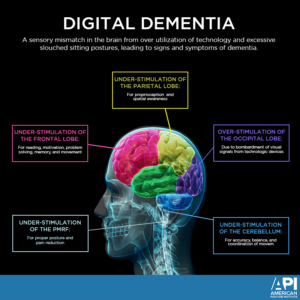Book Treatment Now

Digital Dementia
Digital Dementia refers to memory and cognitive decline due to excessive use of digital technology. Coined by neuroscientist Manfred Spitzer in his 2012 book, the term highlights how our increasing dependence on smartphones, tablets, and other devices impacts brain function, particularly memory and concentration.

The Impact of Technology on Cognitive Abilities
The overuse of mobile devices affects brain development, leading to cognitive imbalance. Heavy reliance on the left brain (associated with logic and reasoning) can result in underdevelopment of the right brain, which is crucial for creativity and emotional processing. This imbalance contributes to digital dementia, with symptoms such as poor memory retention, lack of focus, and reduced problem-solving skills.
Short-Term Memory Decline and Other Consequences
Spitzer explains that “short-term memory pathways will start to deteriorate from under-use if we overuse technology.” This means that tasks requiring memorization and focus become increasingly difficult as technology becomes a substitute for our cognitive efforts.
The negative effects extend beyond memory. Conditions such as ADHD, autism spectrum disorders, anxiety, learning difficulties, and sleep problems have been linked to excessive screen time. The overstimulation caused by technology triggers the same dopamine pathways in the brain as addictive substances like cocaine, opiates, and methamphetamines.
How to Prevent Digital Dementia
To combat digital dementia, it’s important to practice digital detoxes, limit screen time, and engage in activities that stimulate both hemispheres of the brain. Regular physical exercise, mindfulness, and creative hobbies like drawing or music can also help counterbalance the negative effects of technology on brain development.




This concept of Digital Dementia really resonates with me. I’ve noticed a change in how I process information—where I used to easily memorize details or remember directions, I often find myself relying on my phone even for small tasks. It’s a subtle but concerning shift.
I find the concept of digital dementia pretty concerning, especially since we rely so heavily on our devices for everyday tasks. I’ve noticed that my own attention span has shortened, and I often forget simple things like where I placed my keys or appointments I made just minutes ago. It makes me wonder about the long-term effects on creativity and emotional intelligence as well.
This concept of Digital Dementia really resonates with me, especially as we navigate our increasingly tech-centric lives. I’ve noticed that my own attention span has dwindled in the face of constant notifications and the instant gratification of social media. It’s striking how our over-reliance on technology is not just shaping how we communicate but also affecting our cognitive skills in such profound ways.